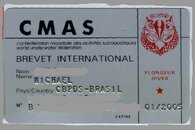grassyknoll
Contributor
Quote:
Originally Posted by grassyknoll
Certified = A known (and perhaps even acceptable) level of experince, ability and skill.
I've worked enough with tourists to know that this isn't correct. I have learned the hard way to never assume that a cert card indicates a level of experience. Watching people put their equipment together is a much better indication of experience.
Suess, I think we are saying the same thing (hence my disclaimer "perhaps even accebtable"). A cert means that the known part is that they sat in a classroom for at least one weekend, spent some time in a pool and were able to perform a few skills at least once. Sort of like having a driver's licence means you likely answered 70% or so of the questions correctly (maybe after failing 5 times), and were able to drive an evaluator around the block without hitting anything. Doesn't make you a comptent driver (or diver), just certified/licensed.




